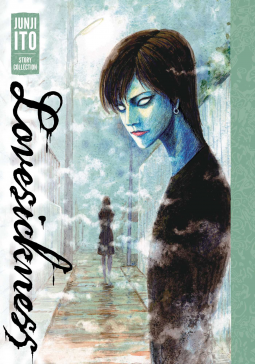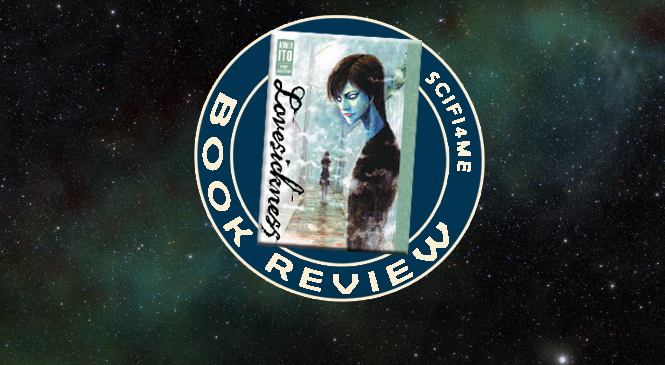LOVESICKNESS: Junji Ito Delivers Trauma, Obsession and Urban Folk Horror


Lovesickness
Art and Story by Junji Ito
Published by Viz Media LLC
April 2021
Hardcover, 410 pages
Junji Ito returns to Viz Media with Lovesickness, a dread shrouded collection of tales absolutely permeated with the horrific darkness that has made him the modern master of horror manga.
The collection consisting of ten stories begins with the titular Lovesickness, consisting of the first five stories forming the longer narrative. The story centers around the young student Ryusuke, who returns to his childhood hometown, a strange fog drenched city that is soon plagued by the Beautiful Boy at the Crossroads, a malevolent entity that drives young girls to suicide.
Sensing a connection to the current tragedies, stemming from a similar incident eight years ago, Ryusuke becomes obsessed with finding the origins of the Beautiful Boy and stopping him at all costs. It’s a task that may cost Ryusuke not only various relationships but his very sanity.
The strongest story cycle in the collection, Lovesickness touches on the despair of survivor’s guilt, metal illness and mass trauma and their effects literally leading some characters to become mere shadows of their former selves. Ito’s highly detailed expressive line work is on full display here as it subtly shifts between delicate facial curves and bold thick crosshatching enveloping characters in ominous blood drenched shadows. For all its bleak subject matter and gruesome imagery, it is ultimately a story of forgiveness and hope.
The second set of two stories introduces us to the strange Hikizuri siblings, a comedically morbid abusive family. A family that enjoys playing homicidal pranks and summoning the spirits of their dead parents to settle family disputes. The family is mean spirited and opportunistic with the comedy arising from how absurdly vile each member of the family truly is. The second oldest son bares a passing resemblance to Uncle Creepy of Warren Publishing’s Creepy while the youngest and brattiest sister is drawn with pigtails and an ever-present demonic grin. Ito’s choice of a caricature-like visual approach to the family serves to reinforce the over-the-top nihilism of the narrative. You won’t find anyone to root for in this family and perhaps that’s the point.
The Mansion of Phantom Pain is a bizarre claustrophobic tale of a chronically ill boy, whose pain permeates the very foundation of his home, and the young man hired to care for him. An effectively chilling Poe-esque narrative that delivers.
Reading like a Japanese urban legend mixed with cautionary tale, The Rib Woman tells the story of Yuki and her struggle with society’s unrealistic beauty standards. Yuki, believing herself to be unattractive in comparison to her brother’s beauty pageant winning girlfriend, struggles with her body image. Yuki makes the decision to undergo extreme plastic surgery. Little does Yuki know that she is being stalked by the Rib Woman, the mysterious first patient of her plastic surgeon.
The final story, Memories of a Real Poop, is a total tonal departure from the previous bone chilling entries. A memoir of a young boy’s love for the most realistic “fake” pile of poop he has ever seen. This oddly awkward remembrance seems out of place ending the collection on a low note.
Originally published in Japanese in 2011, this debut English translation and adaptation by Joceylyne Allen with touch up art and lettering by Eric Erbes makes a great starting point into the dark world of Junji Ito for newcomers and a welcome addition to any Ito collector’s library.
![]()




